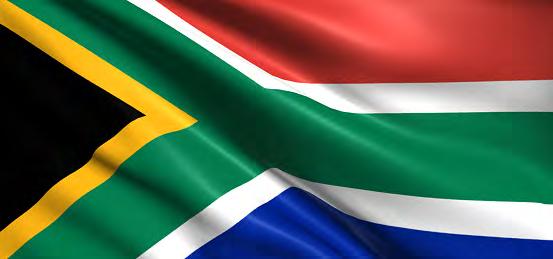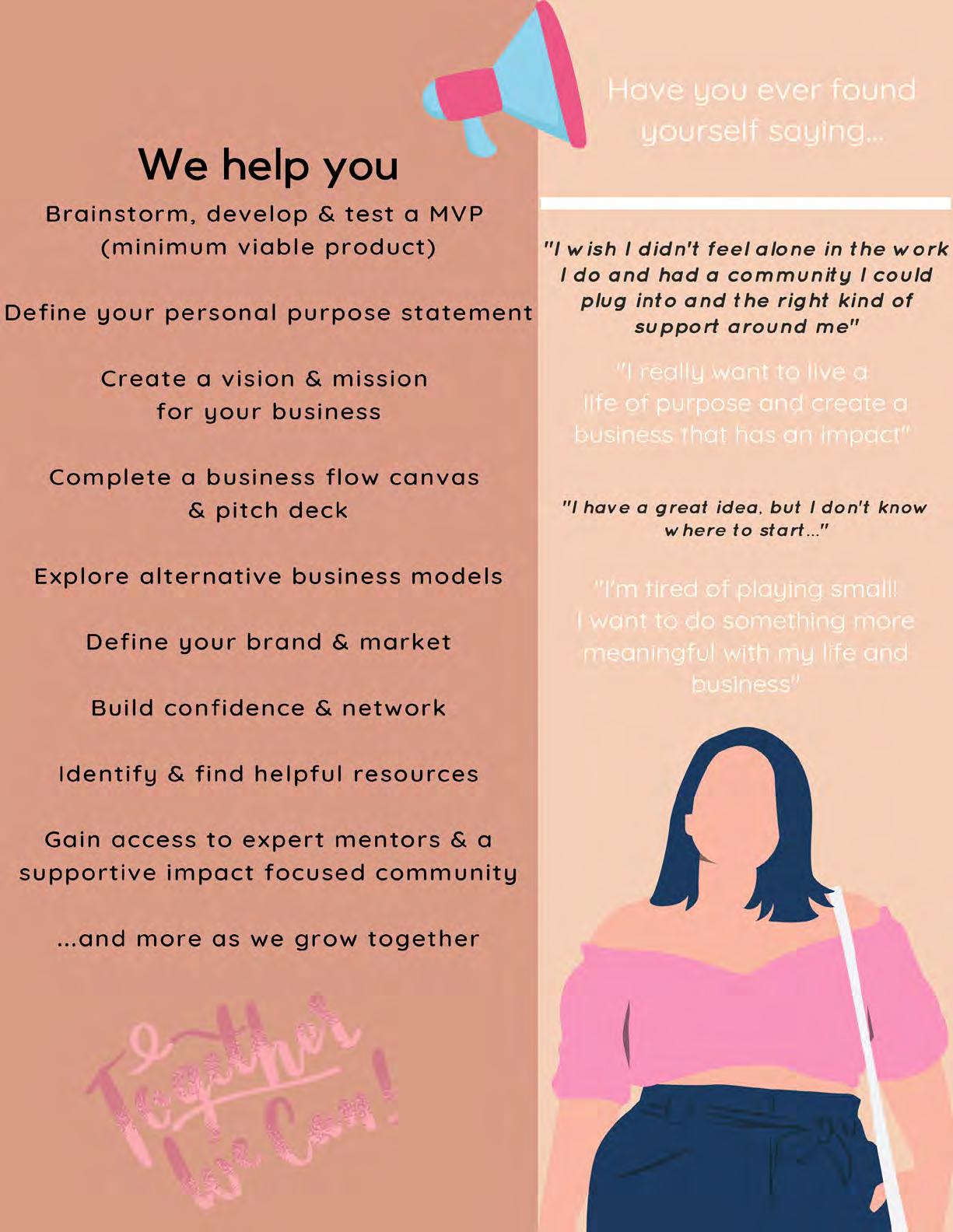
7 minute read
MAKING THE CIRCLE BIGGER
www.growthwheel.com/joinourecosystem
It takes a collaborative village of entrepreneurship support organizations to build and sustain a business ecosystem. For Growthwheel South Africa those Village Pioneers started with Sasol Incubation Enterprise and Supplier Development (ESD) Program in 2012 which was cofunded by the Department of Trade and Industry.
Advertisement
Sasol inspired other incubation early adopters that included Furntec Bandwidth Barn, The Innovation Hub, Kulea Consulting, NGMindset and others to use the same Framework to support Business Owners. The experiences of this Group of Purveyors led Seda to investigate and adopt the Growthwheel Framework for the national incubation program in 2015 when GrowthwheelSA was formally incorporated into the South African economy.
Six years down this journey, Growthwheel SA and the local Entrepreneurship Support Organisation (ESO) Partners are a growing Ecosystem of 300+ ESO’s, Corporate Supplychain enterprise development accelerators, Business Advisors, Mentors. This community of best practice through the integration of a common language, common framework, common tools and common transparent data, is one of South Africa’s most collaborative coop petition networks focused on building innovative and disruptive ideas to the commercialization and transformation of corporate supply chains.
Making the circle bigger goes beyond just the Entrepreneurship Support Organisation’s own sustainability. Growthwheel SA constantly engages policymakers and professional bodies as well as participate in Ecosystem dialogues,
research and quality standards development task-teams to enhance the professionalism of the Sector.
“ Joining ecosystem leaders in the development of the DSBD’s BDS policy framework and incubation standards have been some of the highlights of our intentional contribution to enabling a robust MSME Ecosystem,” says Hilton
Theunissen, co-founder of Growthwheel SA.
GrowthWheelSA trained over 1,000 Ecosystem Builders who worked with some 30,000+ business owners by integrating GrowthWheel’s Toolbox and actively collaborating with entrepreneurs on the growthwheel cloud platform.
Data doesn’t lie and it is why real data together with transparency are so critical to enabling all Stakeholders to make targeted decisions and plan specific interventions to support an SMME’s based on their specific needs. Other than revenue growth, and jobs which serve as key performance indicators, helping entrepreneurs get focused on their ambitions, helping them make decisions

and take actions ultimately delivers the outcomes that build resilient businesses and entrepreneurs.
“ When a flower doesn’t bloom, you fix the environment in which it grows, not the flower.”
by Alexander Den Heijer
With over 100, 000 new jobs created and millions of market access and supply chain transformation deals among entrepreneurs, the GrowthWheel Ecosystem Partners are realizing the benefits of co-creation towards a common goal focused on collective efforts.
It was humbling that the Growthwheel ecosystem was the overall winner for the Global Startup SA and SADC
People’s Choice Best Ecosystem Contribution and Support
Awards in 2019 and a finalist for the Global Startup International Awards in 2020.
The Aspen Network Development Entrepreneurs (Ande) recognize the GrowthWheel Online cloud as the Best Business Support Platform for 2020 which was a testament to the large scale of Digitalisation adoption among small businesses due to Covid19 pandemic and LockdownSA challenges faced by ESO’s and Entrepreneurs.
Professionalism, competency and capacity in an unregulated sector, are common global challenges. In the context of SA with the highest unemployment rate and around 80% of startups and small businesses failing, business development services have become an area that is critical for entrepreneurs to grow and increase their resilience and ability to create jobs.
GrowthWheelSA is mapped to the SAQA Business Advisory Continues Professional Program
administered by the Institute of Business Advisors as well as learning outcomes within the SITA National Qualification Framework for Business Advisor Professionals. GrowthWheelSA’s own continuous learning resources further support Business Advisors to constantly stay on top of their game.
GrowthWheel was discovered
by Entrepreneurship Support Organisations that constantly
shapes the Localisation to be relevant to the Stakeholders it serves. The same ESO community constantly inspires and grows the Ecosystem that enables cocreation, collaboration, common ambitions, common bds language, common frameworks, common data that creates the environment for a business owner to grow.
It is this common transparency that proves that targeted
1:1 business advisory and
mentorship enable business owners to stay focused on their growth ambitions, to make decisions, to take actions to make them more resilient and sustainable. The Real-time data on a common platform gives all Stakeholders the opportunity to plan better and provide targeted support that grows revenue and creates jobs. GrowthWheel South Africa’s mission is to contribute to the national agenda to enable the startup and small growing businesses to be resilient, sustainable, contribute to the economy and create jobs through strengthening the business development support ecosystem. An intentional focus will be
geared towards the woman and youth ecosystem builders to turn
back the tide on unemployment in South Africa.
“ When Entrepreneurs Grow, South Africa Wins. As we head into a decade of collaboration with the Entrepreneurship Support Organizations and GrowthWheelSA’s 7th year of intentional localization, ” David Madie, creator of GrowthWheel, commits “ every rand our loyal customers invest into our business we put back into delivering the best business advisory platform to help business advisors, mentors enterprise development consultants, incubators, accelerators, hubs and small business centres to be the best they can be to support the Clients. ”



Gender and Women Entrepreneurship

ANDE Publications Snapshot Survey
In November 2021, ANDE published its South Africa Township Economy Entrepreneurial Ecosystem Snapshot (Ecosystem Snapshot). This publication provides an entrepreneurial ecosystem mapping of the financial and non-financial support available to townshipbased entrepreneurs, as at November 2021. The publication covers research on the townships of the Eastern Cape, Western Cape, and Gauteng provinces regarding, among other information, the types of support and investment instruments available, and the types of stakeholder interest. This Gender Deep Dive takes a closer look specifically at the support provided to women entrepreneurs in township economies. It is based on desktop research, data from the Ecosystem Snapshot, and 15 in-depth key informant interviews with entrepreneurial support organisations (ESOs) that intentionally seek to improve the lives of women— either as consumers, employees, business leaders, or suppliers and distributors. We asked them about their reasons for focusing on women, their approaches used in doing so, and which approaches have worked particularly well. This report finds that women entrepreneurs in township economies face a double set of intersecting— and mutually reinforcing —challenges. On the one hand, there are challenges due to them being women. This includes the multiple competing demands on women’s time, various prejudices and biases against women business owners, and the challenges inherent in women-dominated sectors, which are often less highgrowth than men-dominated sectors. On the other hand, there are the challenges inherent in being based in a township economy, with lower levels of infrastructure and service provision, higher levels of insecurity and crime, and the business challenges of operating in a relatively lowincome context.
To adequately respond to the realities of township-based women entrepreneurs, the approaches taken by ESOs need to take into consideration both sets of challenges (see below). This report categorises the different approaches observed among ESOs according to which set(s) of challenges they take into consideration.
1Type Type2 3
ESO approaches that take into account the challenges faced by low-income entrepreneurs. These challenges do not necessarily consider the challenges women entrepreneurs face. Such approaches include the use of local languages, catering for low-connectivity environments, and collaborating with industry partners to facilitate connections and referrals. ESO approaches that take into account the challenges and needs of women entrepreneurs. Examples are a focus on messaging and marketing targeted specifically at women, and channels where women are well represented, flexibility through hybrid programme facilitation and blended learning, as well as mentorship.
Type
ESO approaches that take into account the challenges faced as a result of being both a low-income entrepreneur and a woman entrepreneur. These approaches range from very deliberate programme design involving research and deep human-centered design, setting thoughtful targets, and redefining what ‘entrepreneurship success’ looks like, to offering such particular support as pre-programme assistance to improve applications, field visits to applicants, and access to mental health services.
ESOs Need Approaches That Cater for the Two Overlapping and Intersecting Sets of Challenges Faced by Township-Based Women Entrepreneurs

All three types include what we consider ‘good practices’ for building women’s businesses in township economies, but ultimately it is the third type that we believe is transformative. Within the South African context, our interviews found a prevalence of ESOs using types 1 and 2, and only a handful of ESOs using type 3. We recommend that ESOs apply type 3 practices across their programmes, that funders seek and support the application of these practices in the programmes they fund, and that researchers dive deeper into the impact of the varying applications of these practices.











